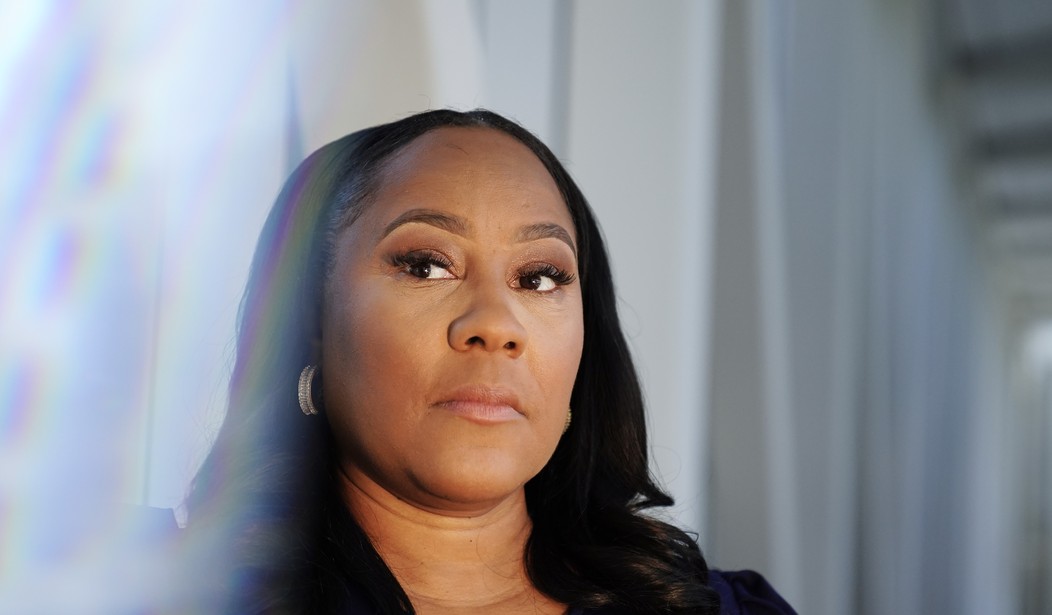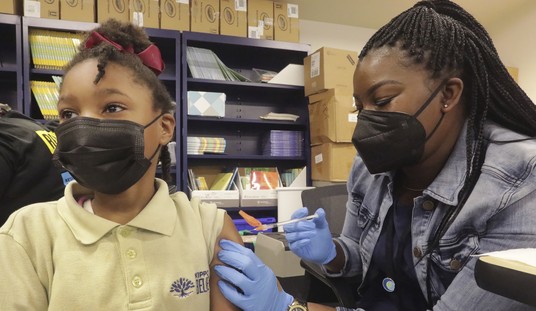Oh my. However much popcorn you prepared for passing during the February 15 hearing in Fulton County, double it. Late last night, the defense attorney in the RICO case of Georgia v Donald Trump et al that forced the hearing over misconduct allegations dropped another bombshell.
In her new filing, Ashleigh Merchant alleges that Fani Willis lied about the start of their romantic relationship. Willis told the court in her response a week ago that she and Nathan Wade did not start dating until after Willis hired Wade as a contract prosecutor. Merchant told the court that she has at least one witness who will testify otherwise -- and that Willis' claim isn't even close to the truth:
The defense lawyer, Ashleigh Merchant, said that a witness she hoped to put on the stand could testify that the romantic relationship between Fani T. Willis, the Fulton County district attorney, and the special prosecutor managing the Trump case, Nathan J. Wade, had begun before Ms. Willis hired Mr. Wade.
That would contradict Mr. Wade, who said in a recent affidavit that his relationship with Ms. Willis had not begun until 2022, after his hiring. The affidavit was attached to a court filing made by Ms. Willis.
Ms. Merchant identified the witness as Terrence Bradley, a lawyer who once worked in Mr. Wade’s law firm and for a time served as Mr. Wade’s divorce lawyer. “Bradley has non-privileged, personal knowledge that the romantic relationship between Wade and Willis began prior to Willis being sworn as the district attorney for Fulton County, Georgia in 2021,” Ms. Merchant’s filing, which came late Friday afternoon, states.
The part about the information being "non-privileged" seems pretty important. If Bradley only discovered that during his legal work for Wade on his divorce from Jocelyn Wade, then Bradley couldn't divulge it even in court (and no judge would countenance it either). Merchant's filing suggests that the romance between Willis and Wade was commonly known at least in Wade's offices, and perhaps in Willis' as well. Merchant served subpoenas on people in both offices and may have other witnesses who will be forced to testify to their own knowledge of the start of the relationship.
Why does this matter? First off, if Willis lied about it in her filing, the court won't just throw her off the case; they'll refer her to the Georgia State Bar for committing perjury, at the least, which could result in disbarment. It's also substantive to Merchant's claim of a conflict of interest and that Willis receives financial benefits for pursuing the prosecution, and hired Wade to ensure it. That's why Willis insisted that the romantic/sexual relationship started after the decision to hire Wade, to parry that accusation by making it appear incidental to the prosecution itself.
If Willis lied about the start of the relationship -- and indeed, if it started before Willis even took office, let alone before hiring Wade to run the RICO case -- it would explain why Wade suddenly rushed to settle his divorce case eleven days ago. Remember that Jocelyn Wade had subpoenaed Willis to testify and that Wade would have had no choice but to get questioned by Jocelyn's attorney. Want to guess what Jocelyn's attorney would have demanded to know? If Willis and Wade were knocking boots in early 2021, that could easily have changed the parameters of the divorce settlement. Even more importantly, it would have destroyed Willis in this upcoming hearing in Judge Scott McAfee's court on Thursday.
Merchant's filing leans heavily into the prosecution-for-financial-enrichment claim, and demands an evidentiary hearing on the matter. But Merchant also uses Willis' public statements to lay out a pattern of deceit that McAfee may have to take into account as well:
“It is evident that the district attorney and her personally-appointed special prosecutor have enriched themselves off this case,” Merchant said in the filing. “That enrichment has taken various forms, not the least of which is incredible amounts of money paid to Wade by Willis that has, in turn, resulted in Willis’ personal financial benefit in the form of vacations, hotel stays and the like that have nothing to do with this case or her official duties as a prosecutor.”
Willis denied wrongdoing in a Jan. 14 address at Big Bethel AME Church, accusing her critics of “playing the race card” while falsely claiming she paid the outside prosecutors the same rate. Roman’s attorneys took note of the speech in the filing, saying her “inflammatory remarks” reflected both “misconduct” and her “personal interest” in the case.
“Since Willis and Wade were not forthright about their relationship in the first instance, there is no reason to believe they are telling the truth now,” Roman’s attorneys said in the filing, which asked for the court to hold an evidentiary hearing in the matter.
On that point, Jonathan Turley warns that false statements by prosecutors is usually a no bueno for the health of their case:
We obviously need to hear from Willis and Wade — and learn more of the details. The key date is November 2021 in terms of the hiring of Wade. There is also the question of how his information was “non-privileged, personal knowledge.” If the affiant is suggesting that there were public displays or confirmation of this relationship, there could be other witnesses who could be called to give accounts.
The filing also suggests that there may have been other trips taken by the lawyers.
Merchant states “[s]ince Willis and Wade were not forthright about their relationship in the first instance, there is no reason to believe they are telling the truth now,”
Notably, the defendants in the Georgia case include those charged with making false statements and filing false documents. If Willis or Wade has now done so, the political and legal impact on the case would be devastating.
The filing itself has other arguments as well. Merchant also attacks Willis' public political campaign against the defendants in the case, including her cooperation with a book co-authored by Michael Isikoff published last month, as efforts to "poison the jury pool." The speech at the church is just the latest and most egregious example:
In light of the attention this case was expected to garner amongst the public, the State had an obligation to protect at all costs the fundamental fairness in the process and to avoid even the appearance of impropriety regarding the State’s motives or the district attorney’s personal or financial incentives in prosecuting the case. But the State did not do that.
Over the past several years, the district attorney has done the opposite, using the media to turn the screws on each of the defendants long before any trial juror was called to serve. These media appearances by a publicly-elected prosecutor are incredibly improper, but more importantly, they were designed to tear down the defendants’ pre-trial constitutional protections. This case should be, and could have been, tried on the evidence admitted at trial. Because of the actions of the district attorney, however, that is no longer possible. The damage is already done. That is why there are specific rules that prevent prosecutors, in particular, from making extra-judicial statements to the news media that are designed to increase the public’s condemnation of the accused before trial starts. That is why the district attorney and special prosecutor must be disqualified from any further prosecution in this case.
Merchant also points out that the financial arrangement sets up incentives to force more provocations against the defendants, as Willis pays Wade by the hour -- and then benefits from the proceeds:
It is evident that the district attorney and her personally-appointed special prosecutor have enriched themselves off this case. That enrichment has taken various forms, not the least of which is incredible amounts of money paid to Wade by Willis that has, in turn, resulted in Willis’ personal financial benefit in the form of vacations, hotel stays and the like that have nothing to do with this case or her official duties as a prosecutor. This enrichment is a form of self-dealing, which creates a personal interest in this case. In other words, the more work that is done on the case (regardless of what justice calls for) the more they get paid. The more they fight Mr. Roman’s motions, the more they get paid. The more they refuse to dismiss defendants who should not be indicted, the more money they make. And, of course, the more money the special prosecutor makes, the more the district attorney gets to reap the financial benefits. These benefits are concrete, personal and financial. They are also at odds with the district attorney’s obligation to seek justice, which is why both the district attorney and special prosecutor will always labor under this conflict, regardless of when their relationship began.3
I wondered about that as well when writing about Willis' February 2 filing. Even if the relationship started after Willis hired Wade, the conflict of interest and personal financial benefit still existed. No company would allow decision-makers to remain in the decision loop if such a relationship developed with a major contractor -- and $650,000 is major. At that point, Willis should have replaced Wade or recused the DA's office entirely from the case. Instead, she received personal benefits from Fulton County funds she paid to her boyfriend -- and the more he billed, the more benefits she could access. In that sense, it doesn't matter when the relationship started but that Wade's employment continued.
But if Willis lied about when it started and Merchant can prove it ... watch out. And pop more popcorn ... a lot more.








Join the conversation as a VIP Member